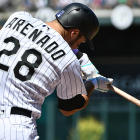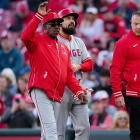The new year is right around the corner, and once the calendar flips over to 2017, baseball will enter extension season. January is when teams start to get serious about signing their arbitration-eligible players, and, inevitably, several of those players wind up signing long-term contracts.
The value of signing a young player to a long-term contract is obvious. You lock the player in at a below-market rate, giving you access to his peak years at an affordable price. Also, it makes the player more valuable in trades. Both Chris Sale and Adam Eaton fetched massive returns earlier this month thanks in part to their team-friendly long-term deals.
The player, on the other hand, gets in a big payday early in his career and sets himself and his family up for life. He trades his maximum earning potential -- going through arbitration and hitting free agency as soon as possible -- for the immediate guarantee. Some of these contracts end up looking like huge steals (like Sale's), but I'll never blame a player for taking millions.
Let's examine 15 of the best extension candidates in baseball before extension season arrives next month. To make life easy, we're going to focus on arbitration-eligible players only. Young stars like, say, Mookie Betts and Kris Bryant and Francisco Lindor, are still in their dirt cheap pre-arbitration years. We're going to leave them out for now. Also, we'll steer clear of players who already have extensions like Mike Trout, even though the Angels would probably like to sign him to an even longer deal.
As a reminder, players need three years of service time to qualify for free agency, though each year a select few qualify with fewer than three years of service time. Those are players, like Bryant, who fall just short of three full years. Those players are dubbed "Super Two" and go through arbitration four times instead of the usual three. Let's break down some extension candidates, shall we? All projected 2017 salaries are per MLB Trade Rumors.

Few plays offer as much two-way impact as Rockies third baseman Nolan Arenado. He's led the NL in home runs, RBI, and total bases each of the last two years, and yes, Coors Field helps, but it's not the only reason Arenado is so great. He's just a tremendous all-around player.
Arenado is entering his second year of arbitration-eligibility as a Super Two, so he has another two arbitration years left after this. He earned $5 million in 2016 and is projected to make $13.1 million in 2017. The Rockies have a history of paying big to keep their own stars, remember. They did it with Todd Helton and Troy Tulowitzki, and Carlos Gonzalez too. Arenado should be next.
Contract benchmark: There are no good benchmarks at this this service time level among Super Two players. Dee Gordon inked a five-year deal worth $50 million last offseason and Arenado would clear that easily. Among non-Super Two players at this service time, both Kyle Seager (seven years, $100 million) and Freddie Freeman (eight years, $135 million) have signed long-term recently. Inflation and the fact Arenado has more earning potential a Super Two means he should beat Seager's and Freedman's deals.
A year ago at this time Cubs ace Jake Arrieta was seeking a massive contract and understandably so. He was the reigning Cy Young award winner and had just put together maybe the greatest pitched second half in baseball history. Arrieta wasn't quite as good this past season, but he was still excellent and will still command a large contract.
Historically, players who sign long-term extensions one year before free agency get paid like free agents. That's why Stephen Strasburg inked a seven-year deal worth $175 million earlier this year, or Clayton Kershaw received a seven-year deal worth $215 million a few years ago. They were on the cusp of free agency and their teams had to pay big to keep them off the market. Arrieta is in the same position.
Contract benchmark: Strasburg more so than Kershaw. Arrieta turns 31 in March while Kershaw was only 25 when he signed his deal. I'm sure the Cubs would prefer to sign Arrieta to Rick Porcello's contract (four years, $82.5 million), but that won't happen. Arrieta's in line for much more.
Xander Bogaerts is the first of the Red Sox's young studs to reach three years of service time and arbitration. He's projected to earn $5.7 million in 2017, which is very rich for a shortstop in his first year of arbitration-eligibility. That's what happens when you're an All-Star and two-time Silver Slugger winner. That stuff matters in the arbitration process.
Boston is trying to stay under the luxury tax threshold and a Bogaerts extension would complicate that -- his luxury tax "hit" would be the average annual value of the extension, which would surely exceed the $5.7 million he's projected to make next year -- but they should explore a deal anyway. It's either save money now and pay big later (no extension) or pay a little more now and save big later (with extension).
Contract benchmark: Seager's seven-year, $100 million contract. Bogaerts should get more because he's younger and plays a more premium position, plus there's inflation to consider, but that's the framework.
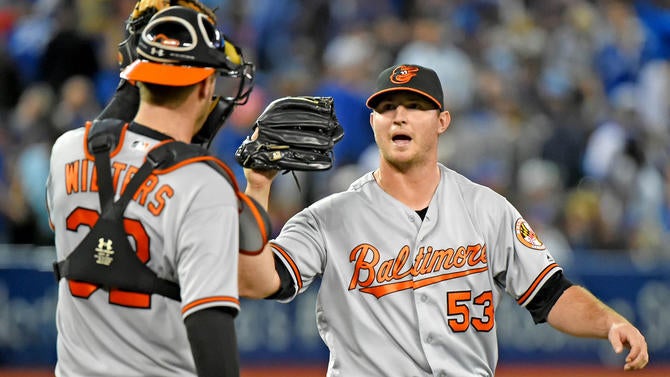
This past season Orioles closer Zach Britton turned in one of the greatest relief seasons in history. He was already one of the best closers in the game, so it wasn't an out-of-nowhere fluke either. Britton has been very good for several years now, and with the bullpen market blowing up, retaining him long-term won't be cheap. He's projected to earn $11.4 million in his third trip through arbitration as a Super Two this winter.
Contract benchmark: There are none. The only relievers to sign multiyear contracts at the same service time level as Britton, Super Two or not, are middle relievers and guys coming back from injuries. Since he's already projected for an $11.4 million salary in 2017, Britton could push for a four-year extension in the $50 million range.
Earlier this offseason Rob Biertempfel of the Pittsburgh Tribune-Review reported the Pirates are unlikely to sign ace right-hander Gerrit Cole, a Scott Boras client, to an extension this offseason. Cole had a down year by his standards in 2016, plus he had some injuries, so his negotiating leverage isn't sky high right now. Still, a 26-year-old with ace upside is someone worth keeping around long-term.
The Pirates have been fairly aggressive locking up their top young players in recent years. All three starting outfielders ( Starling Marte, Andrew McCutchen, Gregory Polanco) have long-term deals, as do Francisco Cervelli and Josh Harrison. Cole is projected to earn $4.2 million as a first time arbitration-eligible player next year, which is a nice price for Pittsburgh. Now would be a good time to explore a long-term deal. It doesn't hurt to ask.
Contract benchmark: Believe it or not, there aren't any good benchmarks. Most pitchers who signed multiyear extensions at Cole's service time level have signed short two or three-year "bridge" contracts. They give the player some guaranteed cash while the team gains cost certainty and mitigates long-term risk. Lance Lynn's three-year, $22 million contract is potential framework for a Cole bridge deal.
The Mets vaunted rotation is about to get very expensive. Matt Harvey is arbitration-eligible for the second time this winter while Jacob deGrom is eligible for the first time as a Super Two. He's projected to make $4.5 million in his first of four trips through arbitration. Given the club's apparently limited payroll, locking deGrom into a long-term contract sure would be a good idea, no?
Contract benchmark: Corey Kluber (five-years, $38.5 million) and Gio Gonzalez (five years, $42 million) give us nice benchmarks. Gio was a Super Two like deGrom. Kluber was not, but he did have a Cy Young to his credit, which would have boosted his arbitration salaries. I think we'd have to adjust upward for deGrom because a few years have passed since those guys have signed their deals -- league-wide inflation has to be considered -- but Kluber and Gio get us in the ballpark.

Well, if you ask Bryce Harper and Scott Boras, Harper deserves a $400 million contract. And you know what? I don't blame them for asking. Harper is a generational talent who showed how great he can be in 2015. And even his down 2016 season wasn't terrible. Remember, teams are buying what the player will do in the future, not what he's done in the past. Harper's upside is scary.
Of course, the Nationals are not willing to meet Harper's $400 million demand right now, and that's reasonable. That down 2016 season did happen, and realistically, how much can his asking price go up next year? The team could wait one more year, see how Harper performs, then decide whether to sign him to a record contract. And it will be a record contract whenever the time comes. I have little doubt about that.
Contract benchmark: Giancarlo Stanton's massive 13-year deal worth $325 million. Stanton signed his deal at the same service time level as Harper, but he was a year older than Harper is now, and he hasn't had a season like Harper's 2015. Giancarlo's deal feels like the starting point for a Harper extension.
Not many folks would consider Dodgers catcher Yasmani Grandal a star, but a switch-hitting catcher with 20-plus home run power and elite pitch-framing ability is a valuable commodity. Here is Grandal's OPS+ by season from 2013-16: 102, 111, 112, 121. That's a real nice progression for a just turned 28-year-old. Quality catching is very hard to find and the Dodgers would be smart to sign Grandal long-term sooner rather than later.
Contract benchmark: Salvador Perez's five-year contract worth $52.5 million. It's not an apples to apples comparison because Perez signed a dirt cheap contract earlier in his career that was being reworked, but I think that's a decent benchmark for Grandal, who is projected to earn $5.3 million in 2017.
A year ago Athletics ace Sonny Gray was one of the best pitchers in baseball. Then, in 2016, he was hurt and ineffective, which created some questions about his long-term outlook. In one way, that makes this the best time for the A's to try to sign him long-term. Gray's stock is down and they have a chance to lock a great pitcher in at an affordable price.
Oakland does have a history of signing their top young pitchers long-term, remember. Trevor Cahill, Brett Anderson, Dan Haren, Barry Zito, Tim Hudson, and Mark Mulder all received long-term deals over the years. Gray figures to be next in line, right? Good pitching is very hard to find, and when you run a shoestring budget like the A's, signing good pitchers to long-term deals is smart business, even if the goal is only enhancing their trade value.
Contract benchmark: As with Cole, there are no good long-term benchmarks for pitchers with three years of service time. Most guys at that service time level sign short-term bridge deals. Gray is projected to earn $3.7 million in 2017.
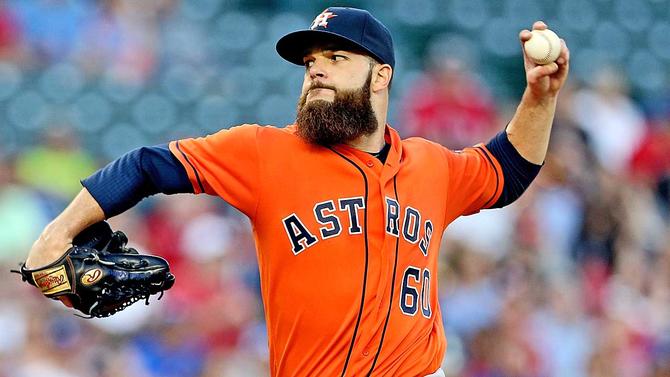
Like Gray, Dallas Keuchel was in the conversation as one of the best pitchers in baseball a year ago, but ineffectiveness and a shoulder injury sabotaged his 2016 season. His stock is down and the Astros are clearly trying to win, so signing their ace long-term time seems worthwhile. This might be the best time to do it.
Keuchel, a former seventh round pick, will turn 29 next month and he didn't get his first huge payday until this past season, when he earned $7.25 million in his first trip through arbitration. A Cy Young will do that. Still, Keuchel might jump at the guaranteed millions after not earning much prior to 2016 and having the shoulder scare this summer.
Contract benchmark: It's a little outdated, but what about Matt Harrison's five-year, $55 million extension a few years back? He was a ground ball southpaw like Keuchel, though he didn't have the Cy Young to his credit. Harrison signed his deal almost four years ago now. Adjusting upward for inflation might get Keuchel into the $70 million range across five years. Not cheap, no doubt, but a heck of a lot less what what he'd get as a free agent.
Kevin Kiermaier is an interesting case. He's barely a league average hitter, but he's an elite defender, which makes him a very valuable player. And, as the Cubs and Jason Heyward showed last year, teams are becoming more willing to pay for defense. The Rays always try to sign their best players long-term, and while Kiermaier may be unconventional as an okay bat/great glove player, he is worth keeping around long-term.
Contract benchmark: Kiermaier is arbitration-eligible for the first time as a Super Two, and he's projected to make $2.1 million through arbitration in 2017. Adam Eaton inked a five-year contract worth $23.5 million at a similar service time level, but he wasn't a Super Two. Eaton is a better hitter though, and offense pays more than defense through arbitration. That might be enough to make up for the Super Two difference.
Like a few other players in this post (Arenado and Harper, most notably), Orioles third baseman Manny Machado is a bonafide superstar and franchise cornerstone. He's two seasons from free agency and obviously the O's want to retain him long-term. They want Machado to be the modern day Cal Ripken Jr., the guy who spends his entire career in Baltimore. Will they pay up to make that happen? It remains to be seen.
Machado, like Harper, is in position to command a $400 million contract. If not now, then in two years when he hits the open market as an elite player at 26 years of age. Those are the guys who get record contracts, the stars who are still in their mid-20s. It's hard to think Machado's next contact will qualify as team-friendly. It's going to be massive.
Contract benchmark: Stanton's deal again. Machado is a year younger now than Stanton was when he signed his contract, and he's been a better all-around player as well. Guys like Machado and Harper can point to Giancarlo's deal as the benchmark for a great young player in his mid-20s.
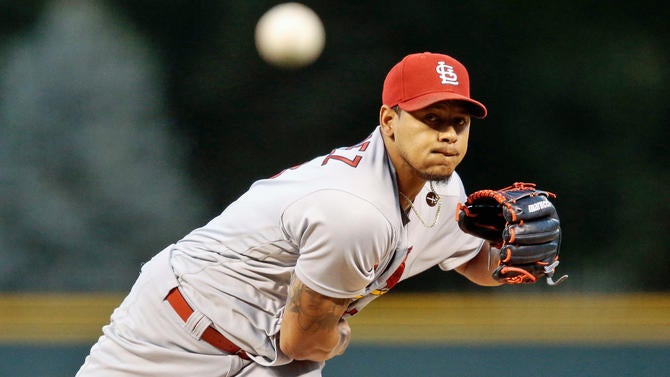
Good news for the Cardinals: ace right-hander Carlos Martinez is open to signing an extension, according to Derrick Goold of the St. Louis Post-Dispatch. It takes two to tango, you know. The player has to be open to an extension, and by all accounts, Martinez is. That's good news for the Cardinals, who have a history of signing their best players to long-term deals. Think Yadier Molina, Adam Wainwright, and Matt Carpenter.
Contract benchmark: Once again, we run into the problem of very few pitchers at the three-year service time level signing long-term contracts. They all seem to take two or three-year bridge contracts. Martinez is projected to make $5.3 million in his first trip through arbitration this winter. There are no good historical precedents for a long-term agreement.
The last few years have been full of peaks and valleys for Nationals third baseman Anthony Rendon. He was fifth in the NL MVP voting in 2014, hurt and ineffective in 2015, and the NL Comeback Player of the Year in 2016. Signing Rendon long-term would give the Nationals two offensive cornerstones (Rendon and Trea Turner) even if Harper leaves as a free agent in two years.
It's important to note Rendon's contract situation is unique. He signed a four-year contract worth $7.2 million as the sixth overall pick in the 2011 draft -- draftees are no longer able to receive major league contracts -- so his early career salaries were higher than most. Rather than make something close to the league minimum in his pre-arbitration years, Rendon earned over $1 million each year. Arbitration salaries are based on the player's salary in the previous year, so Rendon's baseline was much higher than usual. He's projected to make $6.4 million in his second of four trips through arbitration as a Super Two this winter.
Contract benchmark: Once again, Seager's contract with the Mariners works well here. Same position, nearly the same age. Rendon could push for more due to inflation, and the Nationals could respond by saying he's yet to have back-to-back healthy and above-average seasons.
George Springer was the first highly touted position player to arrive as part of the Astros rebuild, which means he's also the first to reach arbitration. He's arbitration-eligible for the first time as a Super Two and is projected to earn a healthy $4.7 million in 2017. Considering Springer has yet to win a major award or go to an All-Star Game, that's a great salary to build off going forward.
It's worth noting the Astros have tried to extend Springer in the past, even when he was still in the minors a la Jon Singleton. It's very unlikely they'll be able to sign him to a sweetheart deal like they Jose Altuve, but signing Springer now will equal savings down the line. His strong two-way game means he'll be paid very well, especially as a Super Two with three more years of arbitration ahead of him.
Contract benchmark: Jay Bruce (six years, $51 million), Matt Carpenter (six years, $52 million), and Jason Kipnis (six years, $52.5 million) all signed similar contracts at the same service time level as Springer, so we have some nice benchmarks. The catch: Bruce signed his deal way back in 2010 and neither Carpenter nor Kipnis were Super Twos. The Astros are going to have to take a few million more onto Springer's deal to reflect the current market.
Other Extension Candidates: Cody Allen, Indians; Trevor Bauer, Indians; Charlie Blackmon, Rockies; Jackie Bradley Jr., Red Sox; Kole Calhoun, Angels; Nick Castellanos, Tigers; Alex Cobb, Rays; Kevin Gausman, Orioles; Didi Gregorius, Yankees; Matt Harvey, Mets; Eric Hosmer, Royals; Ender Inciarte, Braves; Wil Myers, Padres; Jake Odorizzi, Rays; Tanner Roark, Nationals; Danny Salazar, Indians; Marcus Stroman, Blue Jays; Chris Tillman, Orioles






































